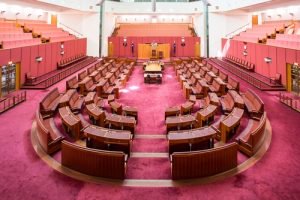A bill to regulate Australia’s digital currency exchanges has gained support from the Senate committee tasked to review it. The committee recommended for the bill to be passed. However, public comments from the industry’s participants suggest that some provisions in the bill are unclear and could reduce competition in the payment industry.
Also read: Australia Introduces Bill That Regulates Bitcoin Exchanges
Crypto Exchange Bill Receives Support
The Australian Senate Legal and Constitutional Affairs Committee published a document last week recommending the “the Anti-Money Laundering and Counter-Terrorism Financing Amendment Bill 2017” be passed.
 This bill was first introduced in August by the Senate and was referred to the Legal and Constitutional Affairs Legislation Committee for inquiry. It contains measures to amend the Anti-Money Laundering and Counter-Terrorism Financing Act of 2006 (AML/CTF Act) in order to strengthen the act and increase the powers of the Australian Transactions and Reporting Analysis Centre (Austrac).
This bill was first introduced in August by the Senate and was referred to the Legal and Constitutional Affairs Legislation Committee for inquiry. It contains measures to amend the Anti-Money Laundering and Counter-Terrorism Financing Act of 2006 (AML/CTF Act) in order to strengthen the act and increase the powers of the Australian Transactions and Reporting Analysis Centre (Austrac).
The bill also contains provisions to regulate digital currency exchange providers. For example, it “seeks to introduce a new designated service and register in order to regulate digital currency exchange, to be introduced within six months of the bill’s commencement,” the document read, adding that:
The bill amends the AML/CTF Act to establish a number of civil penalties in relation to an unregistered person providing digital currency exchange services, which are all subject to strict liability.
Comment Submissions
During the review period, the committee called for public comments. “Submitters to the inquiry were generally supportive of the bill’s measures to implement the reforms,” the document detailed.
 Nine submissions were received, as shown on the Parliament of Australia website. Two of them were related to digital currencies. One was from a leading Australian criminal law firm, Nyman Gibson Miralis. The firm asserted that “the proposed legislative amendments do not seem to contemplate for the likely scenario that an individual can simply choose to exchange with a digital currency provider outside of Australia’s national jurisdiction.” In addition, the firm wrote:
Nine submissions were received, as shown on the Parliament of Australia website. Two of them were related to digital currencies. One was from a leading Australian criminal law firm, Nyman Gibson Miralis. The firm asserted that “the proposed legislative amendments do not seem to contemplate for the likely scenario that an individual can simply choose to exchange with a digital currency provider outside of Australia’s national jurisdiction.” In addition, the firm wrote:
What is unclear is whether the legislative amendments capture a person who exchanges with a digital currency provider outside of Australia. The very nature of bitcoin and other cryptocurrencies are that they transcend Australia’s national jurisdiction.
Hindrance to Small Businesses
The other submission concerning digital currency provisions was from an Australian fintech company that enables customers to pay bills with bitcoin, Living Room of Satoshi. CEO Daniel Alexiuc wrote, “the proposed legislation will have the effect of requiring KYC procedures of our customers for even very small transactions.”
 He noted that most of his company’s transactions are under AUD$1,000 and that any amounts over $1,000 are subject to full KYC procedures. “Adding KYC requirements to low-value payments like this would add unnecessary friction and make this payment system far less attractive than using incumbent payment systems, even if they are more expensive,” he detailed and then elaborated:
He noted that most of his company’s transactions are under AUD$1,000 and that any amounts over $1,000 are subject to full KYC procedures. “Adding KYC requirements to low-value payments like this would add unnecessary friction and make this payment system far less attractive than using incumbent payment systems, even if they are more expensive,” he detailed and then elaborated:
The legislation will impact our current business and stifle future innovation in the area of small payments, since many of our customers will feel KYC is unwarranted and too much of a hassle for small amounts. This will also reduce competition in the payments industry.
Subsequently, he proposed for the legislation to include “an exemption from KYC requirements for low-value payments,” and suggested for the same threshold of $1,000 for Low-Value Non-Cash Payment Facilities to be used.
What do you think of this bill? Will it help or hinder bitcoin adoption in the land down under? Let us know in the comments section below.
Images courtesy of Shutterstock, Nyman Gibson Miralis, and Living Room of Satoshi.
Need to calculate your bitcoin holdings? Check our tools section.














